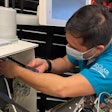
It's morning in a mall outside of a metro station in Washington, DC. Josh, dressed in jeans, a T-shirt, and a baseball hat, picks up his violin and begins to play. Classical music, some of the most complex and beautiful ever written for the instrument, floods the air.
 |
| Healthcare business and legal affairs expert Mark F. Weiss. |
Over the next 45 minutes, more than 1,000 people pass by. Few notice Josh. Only a handful slow down to listen; only six stop. Josh's take: $32.
But Josh isn't one of the thousands of street musicians commonly encountered in cities across the country. As reported by Gene Weingarten of the Washington Post, he's Joshua Bell, the internationally acclaimed violin virtuoso whose performances regularly sell out at more than $100 a seat. The instrument he's playing: a $3.5 million Stradivarius.
The performance was an experiment organized by the Post to see if the public would recognize the beauty of musical genius when displayed in an ordinary context. The experiment was based on the philosophical argument, "What is beauty?" Is beauty a measurable absolute, is it an individual opinion, or is it a bit of both, filtered through the mind of the individual?
As the Joshua Bell experiment demonstrates, beauty and genius are not fixed concepts; individual opinion is involved and context is extremely important.
This message is immediately applicable to how hospital administrators, members of the medical staff, and patients regard and value radiology groups. The greater a group's perceived value, the greater its ability to negotiate a favorable relationship, whether contractual or not.
The Bell experiment validates the negotiation process strategy that I refer to as Framing the Issues, a part of my Strategic Group Process concept. Going one step beyond the conclusion of the Bell experiment, it's possible for radiology groups to proactively alter the context of the metaphorical space in which negotiations take place.
Proactively altering context for Bell means the difference between a $100,000 concert fee and $32 of change tossed into an open violin case. Proactively altering the context for your group can mean the difference between a $50,000 "medical directorship" and adding a $2 million stipend to your bottom line each year.
Altering the context for a musician of Bell's caliber is a relatively simple issue: not the mall or the street corner, but rather a concert hall or a recording studio.
“Every relationship, every negotiation, has a context. ... Proactively altering the context for your group can mean the difference between a $50,000 'medical directorship' and adding a $2 million stipend to your bottom line each year.”
Altering the context for a radiology group is far more complex. Of course, there is an element of physical context: At the extremes, this could be described as the general perception of a group practicing at a world-famous medical center as opposed to a free clinic in a decaying neighborhood.
However, the great majority of radiology groups practice somewhere in the middle, and the physical element lies more in the extent to which any particular hospital is less susceptible to contracting on terms more favorable to the group, especially in regard to protecting scope of clinical privileges and providing significant income support.
Nonetheless, for most radiologists, altering the physical context is not the immediate issue. (But nearly all groups can do something to alter physical context -- a subject that's beyond the scope of this article.) Instead, the immediate issue is taking the correct steps to alter the conceptual context in which the group and its goals are perceived. The ultimate goal is for the group to be considered as unique, the only group with which the hospital will deal.
Perception of the group itself is one of two ways in which context plays a part for radiology group negotiations. The second is the context of the negotiation itself.
In a sense far larger than most people realize, business relationship and contract negotiation are a conversation, like many of the common negotiations that occur in daily life, such as a discussion between spouses as to where to have dinner. Conversations of substance don't happen in a vacuum; they take place within a context: the subject of the conversation.
There's an opportunity, then, to alter the outcome by controlling the context of the business conversation. A very simple example is altering the frame from money to patient care.
To achieve transformational results, framing the issues takes considerable planning and time. In order not to be seen as -- and, actually, not to constitute -- a ruse that will immediately be discounted, the frame must be consistent in the sense of its relationship to the group's overall business strategy, its specific substrategies, and its various implementing tactics.
Remember, every relationship, every negotiation, has a context; the question is whether it will be set by you, set by the other side, or simply left to chance. The latter two alternatives leave you open to happenstance. In any and all events, you are going to face the music; the question is whether they're playing your song.
By Mark F. Weiss
AuntMinnie.com contributing writer
September 11, 2009
Mark F. Weiss is an attorney who specializes in the business and legal issues affecting radiology and other physician groups. He holds an appointment as clinical assistant professor of anesthesiology at University of Southern California's Keck School of Medicine and practices nationally with the Advisory Law Group, a firm with offices in Los Angeles and Santa Barbara, CA. Mr. Weiss provides complimentary educational materials to our readers. Visit www.advisorylawgroup.com for his free newsletter. He can be reached by e-mail at [email protected].
Related Reading
The Profit Center: Part 6 -- Imaging Advantage: Much ado about the same old thing? August 18, 2009
The Profit Center: Part 5 -- Negotiating your group's stipend, July 31, 2009
The Profit Center: Part 4 -- Creating an 'experience monopoly,' July 3, 2009
Readying for the Red Flags Rule: It pays to be prepared, May 26, 2009
The Profit Center: Part 3 -- Crafting effective employment contracts, April 24, 2009
Copyright © 2009 Mark F. Weiss



















